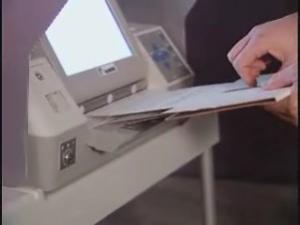Marijuana legalization won in California, Maine, Massachusetts, and Nevada. Medical marijuana won in Arkansas, Florida, Montana, and North Dakota.
New research suggests that, for an aging, aching population, medical marijuana can reduce dependency on opiates while maintaining quality of life.
Trump's drug policy consists mainly of "build the wall," while Clinton offers a detailed proposal and a budget.
Medical marijuana went four for four on Election Day, the feds give up on trying to shut down the Berkeley Patients Group, and more.
A Border Patrol agent goes down for dirty-dealing, an NYPD cop gets nailed for peddling cocaine and ecstasy, an Indiana narcotics supervisor gets caught with his hand in the cookie jar, and more.
California's Prop 64 picks up another high-profile endorsement, the city of Glasgow is moving to establish the United Kingdom's first safe injection site, and more.
It's just about all pot legalization and medical marijuana initiatives today--oh, and Ghana is moving toward drug decriminalization.
It's all marijuana news today: the news from California is good on a couple of fronts, so is the news from the Pentagon and the District of Columbia.
It's just about all pot legalization and medical marijuana initiatives today--oh, and Ghana is moving toward drug decriminalization.
Obama pronounces words we never thought we'd hear from a sitting president, money flows into the initiative states, a new report finds racial disparities in drug arrests persist in California, and more.
Donald Trump wasn't the only big winner on Tuesday. Marijuana law reform also had a stellar night, with medical marijuana winning in all four states it was on the ballot and marijuana legalization winning four out of five.
Pot legalization won in California (
Prop 64), Maine (
Question 1), Massachusetts (
Question 4), and Nevada (
Question 2), losing only in Arizona (
Prop 205), where a deep-pocketed opposition led by a hostile sitting governor managed to blunt the reform thrust. Medical marijuana won overwhelmingly in Florida (
Amendment 2), the first state in the South to embrace full-blown medical marijuana, as well as in Arkansas (
Question 6), Montana (
I-182), and North Dakota (
Measure 5).
This week's election doubles the number of legal marijuana states from four to eight and brings the number of full-fledged medical marijuana states to 28. It also means some 50 million people just got pot-legal, more than tripling the number of people living in states that have freed the weed.
"This is one of the most significant days in the history of marijuana prohibition and this movement," said Rob Kampia, long-time head of the Marijuana Policy Project (MPP), which was behind the legalization initiatives in Arizona, Maine, Massachusetts, and Nevada and which also backed the California initiative. "When four states legalize it, it's a big deal, and California is an even bigger deal. The next time we'll see a day as important as yesterday is when a president signs a bill to end federal marijuana prohibition."
A major question is whether Donald Trump might be that president. During the campaign, he suggested that he would follow President Obama's lead and not interfere with state-level marijuana legalization and regulation (roughly the same position as Hillary Clinton). But his political alliances leave some reformers less than sanguine about a Trump administration.
"Marijuana reform won big across America on Election Day - indeed it's safe to say that no other reform was approved by so many citizens on so many ballots this year," said Ethan Nadelmann, executive director of the
Drug Policy Alliance, which was involved in the California campaign. "But the prospect of Donald Trump as our next president concerns me deeply. His most likely appointees to senior law enforcement positions - Rudy Giuliani and Chris Christie - are no friends of marijuana reform, nor is his vice president.
"The momentum for ending marijuana prohibition took a great leap forward with the victories in California and elsewhere, but the federal government retains the power to hobble much of what we've accomplished," Nadelmann continued. "The progress we've made, and the values that underlie our struggle - freedom, compassion, reason and justice - will be very much at risk when Donald Trump enters the White House."
MPP's Kampia had a more optimistic take.
"The positions of Clinton and Trump were very similar," he said. "We have no reason to believe Trump would escalate the war on nonviolent marijuana users in states where it is legal. States will continue moving forward, and we will see a string of successes in the future, as well as being able to implement the laws passed yesterday."
That remains to be seen, as does the chance that a Republican Congress will move in a positive direction on marijuana. In a Wednesday tele-conference, marijuana reform stalwart Rep. Earl Blumenauer (D-OR), pointed to three areas where congressional action is needed: reforming the IRS's 280-E tax code provision that bars marijuana businesses from getting normal business tax breaks, reforming Treasury Department regulations that bar financial institutions from doing business with pot businesses, and removing barriers to research on marijuana's medical efficacy.
"I believe the next administration will follow the policy of the Obama administration," he said. "We had strong support for legalization in nine diverse states, with more support for these legalize, regulate, and tax policies than for either presidential candidate. The people have spoken, and that will make it easier for us in Congress to build bipartisan support for this legislation. There are now 28 states where there are state-legal businesses having to pay their taxes with shopping bags full of $20 bills. We have growing support in the House and Senate to stop this insanity," Blumenauer said.
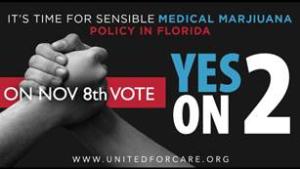
"I believe we will see action within the next two years to stop this discrimination against state-legal marijuana businesses," he prophesied. "Now that the playing field has expanded dramatically, including that overwhelming vote in Florida, which will become the second largest state marijuana market in the country, there is even more incentive. Some representatives are ambivalent or even opposed to marijuana legalization, but will serve their constituents."
But, as DPA's Nadelmann noted, even if Congress is favorably disposed to move in a positive direction on marijuana, the Trump executive branch is likely to feature staunch foes of marijuana law reform. Will advisors and possible appointees such as Chris Christie, Rudy Giuliani, and Mike Pence push Trump to try to undo the spreading marijuana legalization movement? And will Trump listen if they do? We will know the answer to these questions only in the fullness of time.
In the meantime, voters in initiative and referendum states and legislators in states without the initiative process can work to create more facts on the ground, more legalization states. National public opinion polls—and this week's elections—show that marijuana legalization is a winning issue. And the more states that legalize it, the more ridiculous, or as Obama put it this week, "untenable," federal marijuana prohibition becomes. Even a Trump victory, with all the frightening prospects that brings, may not be able to stop the marijuana juggernaut.
back to top
Pain is a drag. And chronic pain is a never-ending drag. Unfortunately, as we grow older, we can expect to increasingly suffer its torments. Half of older adults who live on their own report suffering from chronic pain. For people in elderly care facilities, that figure jumps to somewhere around 80%.

Older patients reported relief and good quality of life with marijuana. (Darren Harris Frisby/DPA)
An aging population with its associated aches and pains is one reason
opioid pain prescriptions have increased so dramatically this century. Opiates are a very popular pain management technique, despite the well-known problems with them, primarily addiction and lethality. They can ease your pain, but they can also kill you or get you strung out. And opiate users report other problems less severe, but still affecting quality of life, such as constipation and foggy-headedness.
In recent years, we have seen increasing evidence that one substance can reduce both pain and the reliance on opioids to treat it, and that its use can have a positive impact on fatal opioid overdoses. That substance is marijuana.
As the Johns Hopkins Bloomberg School of Public Health reported in 2014, "In states where it is legal to use medical marijuana to manage chronic pain and other conditions, the annual number of deaths from prescription drug overdose is 25% lower than in states where medical marijuana remains illegal."
Now, new research findings from Care By Design, one of California's leading medical marijuana producers, add more evidence of the positive role marijuana can play in treating chronic pain and reducing dependence on opioid pain medications. The study surveyed 800 patients, mostly between 50 and 70, more than 80% of whom reported suffering from chronic pain, half of whom reported suffering from acute pain, and more than 40% of whom reported suffering from both.
These patients were in a world of hurt and had tried a number of pain management tools—opiates, medical marijuana, anti-inflammatory agents (NSAIDS), nerve blockers, exercise/physical therapy, and surgery—with respondents reporting trying an average of four of them. A quarter of patients reported having tried all six.
The patients reported that marijuana was very effective for pain, with few negative side effects. That was in striking distinction to opiates, which patients also said were effective for pain, but had a significant negative impact on quality of life for a significant number of them. In fact, the differences between the two substances in terms of quality of life were so dramatic they led to dramatic changes in patient behavior.
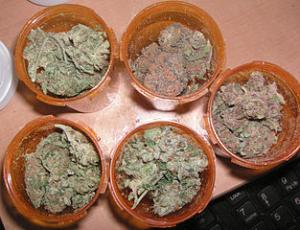
Medical marijuana (Creative Commons/Wikimedia)
"This survey brings some very important information to light," said Care By Design spokesman Nick Caston. "We see here in our patient data that cannabis is improving the quality of life of our patients—particularly elderly patients suffering from age-related pain—and that it does so without the dangerous side effects of other pain management modalities.
"The study’s most striking finding was cannabis’ apparent impact on opiate reliance: Ninety-one percent of survey respondents reported that they decreased the amount of opiates they were taking or eliminated them altogether," Caston continued.
The study also found while marijuana, opiates, exercise/physical therapy, and NSAIDS all provided noticeable pain relief in more than half the patients, marijuana was the only pain management tool where there were no reports of worsening pain. And half of the patients using opiates reported that they had a negative impact on overall well-being, interfering with mood, energy, sleep, and functional abilities.
More than half of the patients reported using both marijuana and opiates to manage pain. But as noted above, nine out of 10 reduced or eliminated their opiate consumption after beginning to use marijuana. And nearly two-thirds (63%) said they were now off opiates altogether.
Over half of respondents reported that they had used both cannabis and opiates for pain management. Of great interest was the impact of cannabis therapy on opiate usage: Ninety-one percent of this subgroup reported that they used fewer or no opiates after beginning cannabis therapy. Sixty-three percent said that they went off opiates altogether.
"A tenet of healthcare in the United States is 'First, do no harm,'" the study concluded. "Patient reports of cannabis’ efficacy together with its low side effect profile suggest that it should be considered as a first-line treatment for pain and/or as an adjunct treatment to opiates rather than as a medication of last resort."
In other words, if we want to reduce the reliance on opioids, with all their negatives, for the management of pain in an aging population, we should be easing access to medical marijuana. With medical marijuana legal in 25 states, we're halfway there.
back to top
(This article was written prior to the election.)
One means of judging the competing presidential candidates is to examine their actual policy prescriptions for dealing with serious issues facing the country. When it comes to drug policy, the contrasts between Hillary Clinton and Donald Trump couldn't be more telling.

Donald Trump talks drugs. (Gage Skidmore/Wikimedia)
The country is in the midst of what can fairly be called an
opioid crisis, with the CDC reporting 78 Americans dying every day from heroin and prescription
opioid overdoses. Both candidates have addressed the problem on the campaign trail, but, as is the case in so many other policy areas, one candidate has detailed proposals, while the other offers demagogic sloganeering.
Guess which is which.
Hillary Clinton has offered a detailed $10 billion plan to deal with what she called the "quiet epidemic" of opioid addiction. Donald Trump's plan consists largely of "build the wall."
That was the centerpiece of his October 15 speech in New Hampshire where he offered his clearest drug policy prescriptions yet (though it was overshadowed by his weird demand that Hillary Clinton undergo a drug test). To be fair, since then, Trump has also called for expanding law enforcement and treatment programs, but he has offered no specifics or cost estimates.
And the centerpiece of his approach remains interdiction, which dovetails nicely with his nativist immigration positions.

Donald Trump wants a wall here to stop drugs and immigrants. (Wikimedia/Creative Commons)
"A Trump administration will secure and defend our borders," he said in that speech. "A wall will not only keep out dangerous cartels and criminals, but it will also keep out the drugs and heroin poisoning our youth."
Trump did not address the failure of 40 years of ever-increasing border security and interdiction policies to stop the flow of drugs up until now, nor did he explain what would prevent a 50-foot wall from being met with a 51-foot ladder.
Trump's drug policy also takes aim at a favorite target of conservatives: so-called sanctuary cities, where local officials refuse to cooperate in harsh federal deportation policies.
"We are also going to put an end to sanctuary cities, which refuse to turn over illegal immigrant drug traffickers for deportation," he said. "We will dismantle the illegal immigrant cartels and violent gangs, and we will send them swiftly out of our country."
In contrast, Clinton's detailed proposal calls for increased federal spending for prevention, treatment and recovery, first responders, prescribers, and criminal justice reform. The Clinton plan would send $7.5 billion to the states over 10 years, matching every dollar they spend on such programs with four federal dollars. Another $2.5 billion would be designated for the federal Substance Abuse Prevention and Treatment Block Grant program.
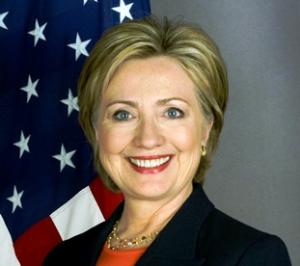
Hillary Clinton has a detailed drug policy position. (state.gov)
While Trump advocates increased border and law enforcement, including a return to now widely discredited mandatory minimum sentencing for drug offenders, Clinton does not include funding for drug enforcement and interdiction efforts in her proposal. Such funding would presumably come through normal appropriations channels.
Instead of a criminal justice crackdown, Clinton vows that her attorney general will issue guidance to the states urging them to emphasize treatment over incarceration for low-level drug offenders. She also supports alternatives to incarceration such as drug courts (as does Trump). But unlike Trump, Clinton makes no call for increased penalties for drug offenders.
Trump provides lip service to prevention, treatment and recovery, but his rhetorical emphasis illuminates his drug policy priorities: more walls, more law enforcement, more drug war prisoners.
There is one area of drug policy where both candidates are largely in agreement, and that is marijuana policy. Both Clinton and Trump have embraced medical marijuana, both say they are inclined to let the states experiment with legalization, but neither has called for marijuana legalization or the repeal of federal pot prohibition.
If Clinton's drug policies can be said to be a continuation of Obama's, Trump's drug policies are more similar to a return to Nixon's.
(This article was prepared by StoptheDrugWar.org"s lobbying arm, the Drug Reform Coordination Network, which also pays the cost of maintaining this web site. DRCNet Foundation takes no positions on candidates for public office, in compliance with section 501(c)(3) of the Internal Revenue Code, and does not pay for reporting that could be interpreted or misinterpreted as doing so.)
back to top
Medical marijuana went four for four on Election Day, the feds give up on trying to shut down the Berkeley Patients Group, and more.
NationalOn Monday, a new report called marijuana a "promising option" for dealing with opioid addiction. A new report from the National Cannabis Industry Association finds that increasing legal access to marijuana can be a potent weapon in the fight against opioid addiction. The report finds significant progress in reducing addiction and overdose deaths in states that have legalized it.
Arkansas
Last Thursday, the state Supreme Court rejected a bid to reinstate a medical marijuana initiative. The state's high court Thursday denied a petition for a rehearing on its decision to disqualify Issue 7. Another medical marijuana initiative, Issue 6, remains on the ballot.
On Tuesday, Arkansas voters approved Issue 6.
California
Last Monday, the feds gave up on trying to shut down Berkeley's flagship dispensary. The Justice Department has given up on its efforts to shut down the Berkeley Patients Group. The three-year effort came to an end Monday, when federal prosecutors in San Francisco filed a motion to dismiss their civil forfeiture case against the dispensary. City officials had supported the dispensary in its battle with then-US Attorney Melinda Haag. The move is the latest sign the federal government is winding down efforts to go after marijuana businesses in states where they are legal.
District of Columbia
Last Thursday, the DC council approved letting out of state patients purchase medical marijuana. The council has approved a measure to let medical marijuana users from other states use their registration cards to purchase their medicine in the District. The vote was unanimous.
Florida
On Tuesday, the Amendment 2 medical marijuana initiative passed with 71% of the vote.
Montana
On Tuesday, the I-182 medical marijuana initiative passed with 57% of the vote.
New Mexico
Last Friday, a panel voted to allow medical marijuana for "opiate use disorder." A state advisory board that makes recommendations to the Health Department on New Mexico’s Medical Cannabis Program voted 5-1 in favor of adding "opiate use disorder" to the list of conditions that qualify. Now, it's up to incoming Health Secretary Lynn Gallagher to accept or deny the recommendation. Such a move could add thousands of new patients to the state's rapidly expanding medical marijuana program.
North Dakota
Last Friday, the medical marijuana initiative campaign got a nice cash boost. North Dakota for Compassionate Care, the group behind the Measure 5 medical marijuana initiative has received an unexpected last-minute donation of $15,000 from Drug Policy Action, the lobbying and campaign arm of the Drug Policy Alliance. The group will use the money for a final advertising push to get their message out to voters ahead of next week's elections.
On Tuesday, Measure 5 passed with 64% of the vote.
[For extensive information about the medical marijuana debate, presented in a neutral format, visit MedicalMarijuana.ProCon.org.]
back to top
A Border Patrol agent goes down for dirty-dealing, an NYPD cop gets nailed for peddling cocaine and ecstasy, an Indiana narcotics supervisor gets caught with his hand in the cookie jar, and more. Let's get to it:
In McAllen, Texas, a US Border Patrol agent was arrested last Monday after he admitted working with drug dealers to stage a seizure of fake cocaine so that the real drugs could be distributed. Agent Eduardo Bazan Jr., 48, admitted taking $8,000 from a drug ring that ripped off cocaine from other suppliers, diluted the drugs, and then ensured that police seized them. It's not clear what the exact charges he faces are.In Buckingham, Virginia, two state prison guards were arrested last Thursday after they were filmed buying drugs that federal agents said were intended to be smuggled into the Buckingham Correctional Center. The bust was part of a larger gang racketeering bust that netted 20 arrests in Virginia and New York. The two guards, Shonda Jones and Jaymese Jones, face as yet unspecified federal charges.
In New York City, a former NYPD officer was convicted last Thursday of helping to run drugs throughout the Bronx and providing protection to drug gangs. Merlin Alston, 33, was part of a long-running conspiracy to traffic large amounts of cocaine and ecstasy in the Bronx. He was convicted of one count of conspiracy to distribute narcotics and one count of possession of firearms in furtherance of the narcotics conspiracy. He's looking at a 15-year mandatory minimum sentence.
In Columbus, Indiana, a former Columbus police narcotics supervisor pleaded guilty last Thursday to stealing drugs from the department's evidence room under the guise of using them for training purposes. Jeremy Coomes, 39, checked out drug evidence from as many as 10 cases, and when it was returned, some of it was missing, some had been replaced with other substances, and evidence seals had been tampered with or altered. Coomes was originally hit with seven felonies, but copped to a single count of felony meth possession. He's looking at between three and 16 years in prison.
In Charleston, South Carolina, a former prison guard was sentenced last Wednesday to six months in prison for giving marijuana to a prisoner at the Estill Federal Correctional Institution. Anthony Jermaine Creech, 39, admitted delivering an ounce of pot to an inmate in exchange for money.
back to top
California's Prop 64 picks up another high-profile endorsement, the city of Glasgow is moving to establish the United Kingdom's first safe injection site, and more.
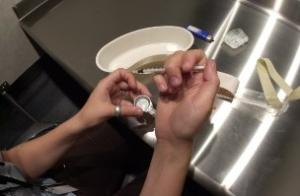
The Vancouver InSite supervised injection site. Something similar could soon be coming to Scotland. (vch.ca)
Colorado Lawmakers Call on Arizona "No" Campaign to Quit Using Inaccurate Ads. Three Colorado state legislators Monday sent letters to the campaign opposing the Prop 205 legalization initiative calling on it to quit misstating facts about what has happened since legalization in Colorado. The "no" campaign has claimed that Colorado schools have not seen any money from marijuana revenues, but the legislators point out that the state Department of Education has received more than $138 million in pot tax revenues. "They are saying these things that area really far field from the truth," state Sen. Pat Steadman. "We've been building schools and repairing schools with the excess tax revenue that was dedicated to school construction. Those dollars are flowing."
Former Los Angeles Mayor Endorses California Legalization Initiative. Former Los Angeles Mayor Antonio Villaraigosa (D) Monday became the latest well-known California politician to endorse the Prop 64 legalization initiative. "I took my time on this measure because I wanted to make sure it included protections for children and public safety," Villaraigosa said in a statement. "In evaluating the measure in its entirety, I am convinced there are enough safeguards to make it a workable proposition."
Medical Marijuana
Disqualified Arkansas Initiative Asks State Supreme Court to Reinstate It. Backers of the Issue 7 medical marijuana initiative are seeking recourse from the state's highest court after that same court last week disqualified it days after early voting began in the state. In a ruling last week, the high court said the campaign had violating state laws regarding reporting and registration of paid canvassers and threw out 12,000 signatures that had been approved by state election officials. But the Issue 7 campaign argues that a 2013 law imposing restrictions on paid canvassers is unfair to smaller groups. The state Supreme Court rarely grants petitions for a rehearing. A competing initiative, Issue 6, remains on the ballot.
International
Glasgow Moves Toward Opening Forced Supervised Injection Facility in the UK.The Glasgow City Alcohol and Drug Partnership is pushing plans for the first safe injection sites in the United Kingdom. The notion is to be considered by the city council, the health board, and the police, all of whom are expected to agree in principle to the idea. Stay tuned.
back to top
It's just about all pot legalization and medical marijuana initiatives today--oh, and Ghana is moving toward drug decriminalization.

It's looking like legal buds are coming to Boston. (Creative Commons/Wikimedia)
Another New National Poll Has a Solid Majority for Marijuana Legalization. A new American Values Survey conducted by the Public Religion Research Institute finds that 63% of Americans 18 and over favor freeing the weed. Only three years ago, the survey had support for legalization at only 45%. The poll is in line with other recent national opinion polls that show solid majorities for marijuana legalization.
Former DEA Heads Ask California Governor to Take Stand Against Legalization. Gov. Jerry Brown (D) has yet to take a position on the Prop 64 legalization initiative, and now five former DEA heads are urging him to come out against it. They cited alleged problems with drugged driving and use by teens in Colorado. "Let us at least see if these negative trends continue before taking this plunge," the letter said. "This means that Californians, many of whom will listen to you, should vote against Prop 64. Is it wise social policy to adopt a measure that will substantially increase the numbers of marijuana users, including our youth? The letter was signed by former DEA administrators Robert C. Bonner, Jack Lawn, Karen Tandy, Peter Bensinger and Michele Leonhart.
New Massachusetts Poll Has Legalization With Wide Lead. A new poll from the Western New England University Polling Institute has the Question 4 legalization initiative winning handily with 61% of the vote. Only 34% were opposed. The "yes" vote is up nine points from the group's previous poll at the end of September. The measure had a whopping 81% support among voters under age 40.
Medical Marijuana
Arkansas Supreme Court Rejects Bid to Reinstate Initiative; One Still Remains on the Ballot. The state's high court Thursday denied a petition for a rehearing on its decision to disqualify Issue 7. Another medical marijuana initiative, Issue 6, remains on the ballot.
North Dakota Initiative Campaign Gets Last Minute Cash. North Dakota for Compassionate Care, the group behind the Measure 5 medical marijuana initiative has received an unexpected last-minute donation of $15,000 from Drug Policy Action, the lobbying and campaign arm of the Drug Policy Alliance. The group will use the money for a final advertising push to get their message out to voters ahead of next week's elections.
International
Ghana Moving Toward Drug Decriminalization. The country is moving to decriminalize drug use as a means of better managing addiction, Deputy Interior Minister James Agalga said Thursday. Under a bill moving through parliament, users would receive clinical care and treatment instead of prosecution and incarceration. "Those who are addicted and under normal circumstances ought to be treated as patients who need care in the hospital," he explained.
back to top
It's all marijuana news today: the news from California is good on a couple of fronts, so is the news from the Pentagon and the District of Columbia.

Will we see these in Arkansas next year? (Creative Commons/Wikimedia)
US Military May Ease Up on Marijuana Use By Recruits. Defense Secretary Ash Carter said Tuesday that the Pentagon is undertaking a wide-ranging review of recruiting standards and practices to ensure they are not "unnecessarily restrictive," including a review of rules governing past marijuana use by recruits. Under current policy, a potential recruit can be rejected for testing positive for pot or admitting past habitual marijuana use.
Latest California Poll Has Legalization Initiative Winning Comfortably. In line with all other recent polls, a new USC Dornsife/Los Angeles Times poll has the Prop 64 initiative winning with 58% of the vote. Support was strongest among voters under 30, 74% of whom said they were voting for the initiative. "The electorate has gotten younger and more demographically diverse," said Dan Schnur, director of the poll, reflecting on differences with 2010, when a legalization initiative lost by six points. "The change over the last six years has been more cultural than political. Society feels differently about marijuana legalization now than it did then."
Medical Marijuana
Arkansas Poll Shows Tight Race for Medical Marijuana Initiative. A new University of Arkansas poll shows voters evenly split on the Issue 6 medical marijuana initiative. The poll of likely voters has 49% in favor, with 47% opposed. The poll was conducted before a competing initiative, Issue 7, was disqualified from the ballot by the Supreme Court. Support was similar for Issue 7, with 48% in favor and 45% opposed. Issue 7 will remain on the ballot, but votes for and against it will not be counted.
DC Council Okays Letting Out-of-State Patients Purchase Medical Marijuana. The council has approved a measure to let medical marijuana users from other states use their registration cards to purchase their medicine in the District. The vote was unanimous.
Feds Give Up on Trying to Shut Down Flagship Berkeley Dispensary. The Justice Department has given up on its efforts to shut down the Berkeley Patients Group. The three-year effort came to an end Monday, when federal prosecutors in San Francisco filed a motion to dismiss their civil forfeiture case against the dispensary. City officials had supported the dispensary in its battle with then-US Attorney Melinda Haag. The move is the latest sign the federal government is winding down efforts to go after marijuana businesses in states where they are legal.
back to top
It's just about all pot legalization and medical marijuana initiatives today--oh, and Ghana is moving toward drug decriminalization.

It's looking like legal buds are coming to Boston. (Creative Commons/Wikimedia)
Another New National Poll Has a Solid Majority for Marijuana Legalization. A new American Values Survey conducted by the Public Religion Research Institute finds that 63% of Americans 18 and over favor freeing the weed. Only three years ago, the survey had support for legalization at only 45%. The poll is in line with other recent national opinion polls that show solid majorities for marijuana legalization.
Former DEA Heads Ask California Governor to Take Stand Against Legalization. Gov. Jerry Brown (D) has yet to take a position on the Prop 64 legalization initiative, and now five former DEA heads are urging him to come out against it. They cited alleged problems with drugged driving and use by teens in Colorado. "Let us at least see if these negative trends continue before taking this plunge," the letter said. "This means that Californians, many of whom will listen to you, should vote against Prop 64. Is it wise social policy to adopt a measure that will substantially increase the numbers of marijuana users, including our youth? The letter was signed by former DEA administrators Robert C. Bonner, Jack Lawn, Karen Tandy, Peter Bensinger and Michele Leonhart.
New Massachusetts Poll Has Legalization With Wide Lead. A new poll from the Western New England University Polling Institute has the Question 4 legalization initiative winning handily with 61% of the vote. Only 34% were opposed. The "yes" vote is up nine points from the group's previous poll at the end of September. The measure had a whopping 81% support among voters under age 40.
Medical Marijuana
Arkansas Supreme Court Rejects Bid to Reinstate Initiative; One Still Remains on the Ballot. The state's high court Thursday denied a petition for a rehearing on its decision to disqualify Issue 7. Another medical marijuana initiative, Issue 6, remains on the ballot.
North Dakota Initiative Campaign Gets Last Minute Cash. North Dakota for Compassionate Care, the group behind the Measure 5 medical marijuana initiative has received an unexpected last-minute donation of $15,000 from Drug Policy Action, the lobbying and campaign arm of the Drug Policy Alliance. The group will use the money for a final advertising push to get their message out to voters ahead of next week's elections.
International
Ghana Moving Toward Drug Decriminalization. The country is moving to decriminalize drug use as a means of better managing addiction, Deputy Interior Minister James Agalga said Thursday. Under a bill moving through parliament, users would receive clinical care and treatment instead of prosecution and incarceration. "Those who are addicted and under normal circumstances ought to be treated as patients who need care in the hospital," he explained.
back to top
Marijuana Policy
President Obama Says Federal Pot Prohibition in Question After Tuesday's Vote. Appearing on the Bill Maher Show Friday night, President Obama said federal marijuana prohibition will not "be tenable" if more states vote to legalize the weed on Tuesday. "The good news is is that after this referenda, to some degree it’s gonna call the question, because if in fact it passed in all these states, you now have about a fifth of the country that’s operating under one set of laws, and four-fifths in another," Obama said. "The Justice Department, DEA, FBI, for them to try to straddle and figure out how they’re supposed to enforce laws in some places and not in others — they’re gonna guard against transporting these drugs across state lines, but you’ve got the entire Pacific corridor where this is legal — that is not gonna be tenable," he said.
Maine Legalizers Have Huge Cash Advantage. Supporters of the Question 1 marijuana legalization initiative have raised more than $2.4 million dollars, according to campaign finance reports, while opponents have raised only $201,000. Most of the pro-legalization money has come from the New Approach PAC, the instrument of the heirs of late Progressive Insurance founder and drug reform philanthropist Peter Lewis, while 99% of the anti-legalization money has come courtesy of Project SAM's Kevin Sabet, who now heads the newly formed non-profit Alliance for Healthy Marijuana Policy.
Las Vegas Casino Magnate Sheldon Adelson Again Kicks in Against Nevada Pot Initiative. The Sands Corporation head honcho and prolific funder of anti-drug reform efforts has given more than $1.35 million to the campaign trying to defeat the Question 2 marijuana legalization initiative in recent weeks, according to campaign finance reports. That's on top of $2 million he gave opponents in September. In fact, Adelson is virtually a one-man opposition campaign, having provided 97.4% of all reported opposition campaign contributions. Proponents of Question 2 have raised only $1.2 million.
Medical Marijuana
New Report Calls Marijuana a "Promising Option" for Dealing With Opioid Addiction. A new report from the National Cannabis Industry Association finds that increasing legal access to marijuana can be a potent weapon in the fight against opioid addiction. The report findssignificant progress in reducing addiction and overdose deaths in states that have legalized it.
New Mexico Panel Votes to Allow Medical Marijuana for "Opiate Use Disorder." A state advisory board that makes recommendations to the Health Department on New Mexico’s Medical Cannabis Program voted 5-1 Friday in favor of adding "opiate use disorder" to the list of conditions that qualify. Now, it's up to incoming Health Secretary Lynn Gallagher to accept or deny the recommendation. Such a move could add thousands of new patients to the state's rapidly expanding medical marijuana program.
Asset Forfeiture
Montana Supreme Court Affirms Right to Jury Trial in Civil Forfeiture Cases. In a ruling last week, the state high court upheld and strengthened a 2015 law that reformed asset forfeiture procedures. The ruling came in the case of a man whose land was seized after police found 300 marijuana plants on it. The man was convicted of federal drug charges, but not prosecuted by the state. Even though he faced no state charges, the state seized his land. He requested a jury trial, but was denied in lower court, and a judge turned the property over to the state. But the Supreme Court said the 2015 law supplanted older law on which the trial judge based his decision.
Law Enforcement
Even As Arrests Drop, California Racial Disparities Persist. A new report from the office of Attorney General Kamala Harris finds that arrest rates for all racial groups have dropped in the past decade, but blacks were still much more likely than whites to be arrested on felony charges. When it comes to drugs, black men were six times as likely as whites to be arrested, and black women were nearly three times as likely to be arrested as whites. Latinos, on the other hand, were arrested for drugs at roughly the same rate as whites.
back to top
